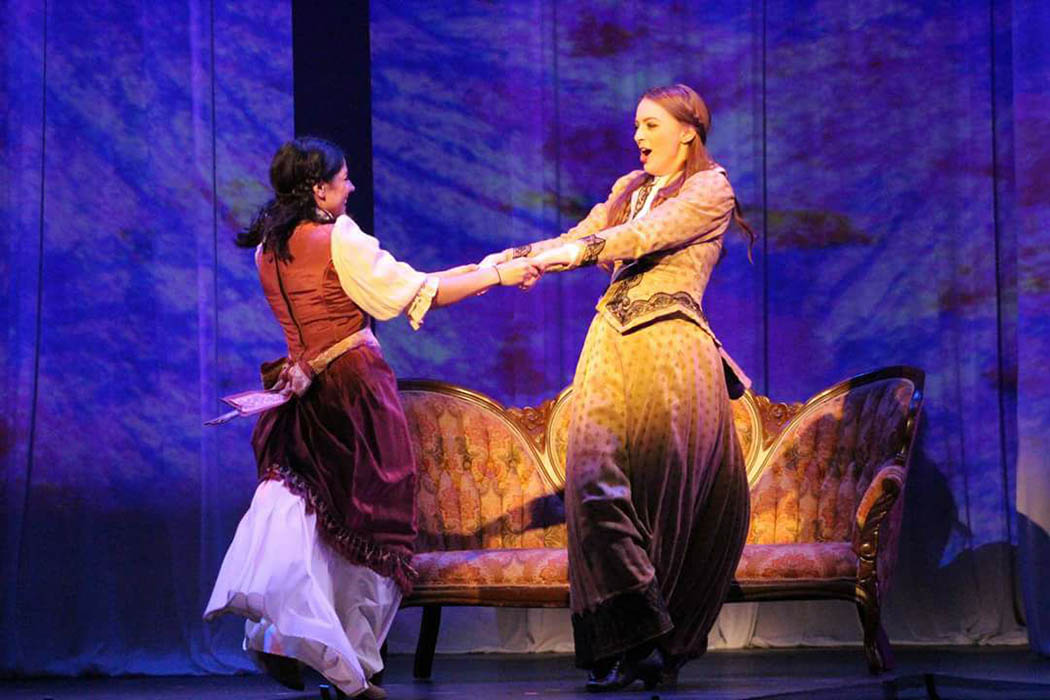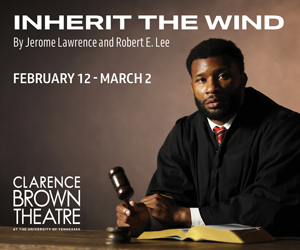It was probably just coincidence that the University of Tennessee Opera Theatre chose the 2015 chamber opera Middlemarch in Spring for its April opera production precisely at a time when the issues surrounding gender equality in society have finally come to prominence. Still, one couldn’t help feeling the parallels between the current real world efforts and composer Allen Shearer and librettist Claudia Stevens’ narrative, a well-crafted poetic storyline which is an extraction from George Eliot’s great 1872 novel Middlemarch.
Stevens chose one aspect of the Eliot novel, centering the story on the character of Dorothea Brooke, one of two sisters living with their uncle on an English country estate. In the belief that she can only gain a purpose in life by marrying, Dorothea weds the older Edward Casaubon, a “scholar” consumed by feelings of his own self-importance. Dorothea’s hope that he will allow her to gain life fulfillment by sharing in his intellectual work is shattered by Casaubon’s refusal and by his jealousy of his cousin Will Ladislaw’s “youthful exuberance” and the young man’s attraction to Dorothea. Fortunately, Casaubon suffers a heart attack and succumbs, but not without leaving a codicil to his will preventing Dorothea from inheriting his money if she remarries Ladislaw. Eventually, Dorothea chooses love over the money to join Ladislaw and his nascent political ambitions involving justice for all—with “spring” being the apparent populist metaphor here.
Shearer’s orchestral score for a chamber-size ensemble—heard here from the UT Opera Orchestra under music director/conductor Kevin Class—was quite satisfying, its dramatic suggestiveness flowing out of atonal conflict mixed with addictive, quirky textures and bold statements from individual instruments. However, Shearer’s vocal lines worked best when in lyrical mode for special moments; otherwise, the uncomfortable intervals of recitative-like conversational dialog was an unnecessary challenge of rhythm and emphasis for many of the singers.
UTOT Director James Marvel worked his usual magic with a double cast of singers over the four performances. Of course, with differences in vocal personality, dramatic approach, and experience among the singers, the multiple casts offer some enlightening comparisons.
Appearing in both casts as the silly and foolish Mr. Brooke was Breyon Ewing, a singer whose stage presence and comic ability made him a visual magnet in the scenes he was in. Having a similar stage and vocal magnetism in the “Evening” cast was the dramatic soprano Elena Stabile in the role of Dorothea. Visually, she was the perfect image of Dorothea—intelligent, conflicted, but eager to find a purpose for herself within the confines of the 19th Century English social system. Dorothea’s sister Celia Brooke was sung by Leslie Ostransky, who nailed the character’s shallowness and feather-light personality in vivid contrast to Dorothea. Griffen Hogan Tracy gave his Edward Casaubon an insidious maliciousness that was quite frightening. James Berkeley Wilson, seen last fall as one of the Almavivas in UTOT’s The Marriage of Figaro, got another opportunity for character meanness in his Sir James Chettam, the landed noble who marries Celia when he can’t get Dorothea. Lee Brandt sang the role of Will Ladislaw.
In the “Matinee” cast, Dorothea was sung by Kayla Beard. Beard brought a lyrical soprano voice to the role and a slightly softer sense of dramatic conflict. I particularly admired Beard’s ability to make beautiful rhythmical sense out of Shearer’s recitative-like dialog. Kathryn Shepas, who made quite a statement as Barbarina in UTOT’s The Marriage of Figaro and as Amahl in Marble City Opera’s Amahl and the Night Visitors, sang sister Celia. Ian Bolden was an equally evil Casaubon; Brad Summers sang Sir James. Tenor Joshua Allen sang the role of Will Ladislaw in the matinee cast, bringing not only vocal strength and clarity, but quite a lot of romantic chemistry in his struggle to woo Dorothea.
While compelling voices and orchestral performance were essential in a work like Middlemarch in Spring, Marvel and his artistic colleagues provided the visual glue that bound the production to the score. The lighting and projections by Maranda DeBusk painted the hanging cloth set with both color and visual references that supported the rhythm, flow, and emotional premise of the opera. On a subtle, but satisfying, note—those that viewed multiple performances could see all aspects of the production—pace, rhythm, cueing, cohesiveness—becoming finessed and crisp…certainly marks of great training.






